Why you can trust Tom's Hardware
Workstation CPU and GPU Benchmarks Test Notes
Some of these applications also make an appearance in our standard test suite, but those test configurations and benchmarks are focused on a typical desktop-class environment. In contrast, the following tests are configured to stress the systems with workstation-class workloads. Because these are more oriented to prosumer/professional use cases, we limited our test pool to the Ryzen 9/Core i9 and Ryzen 7/Core i7 processors.
We loaded down our test platforms with 64GB of DDR4 or DDR5 memory spread across four modules to accommodate the expanded memory capacity required for several of these workstation-focused tasks. We used the officially supported stock memory speeds for 2DPC configurations. Notably, the Ryzen 7000 chips support ECC memory by default, though motherboard vendors have to certify their own implementations. Intel’s Alder Lake also supports ECC memory, but only on its workstation-focused W-series motherboards.
Adobe Premiere Pro and Lightroom and Benchmarks on AMD Ryzen 9 7950X
Puget Systems is a boutique systems vendor that caters to professional users with custom-designed systems targeted at specific workloads. The company has developed a series of acclaimed benchmarks for Adobe software, which you can find here.
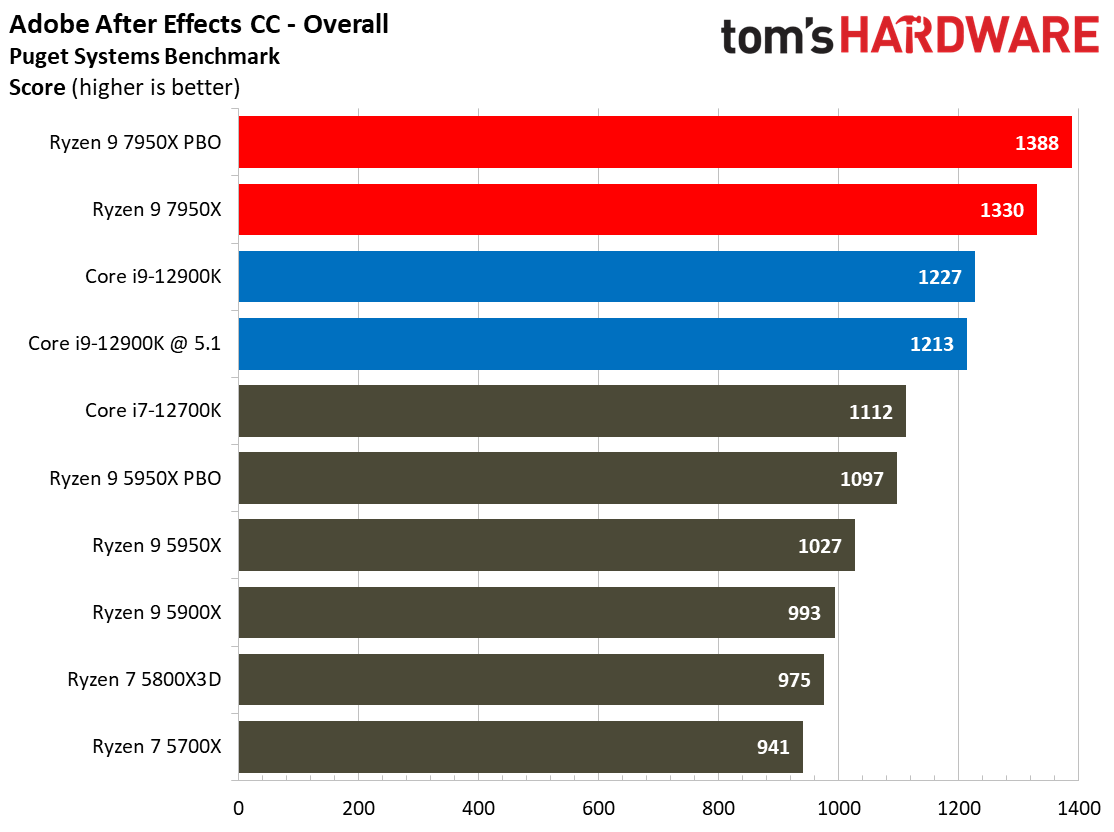
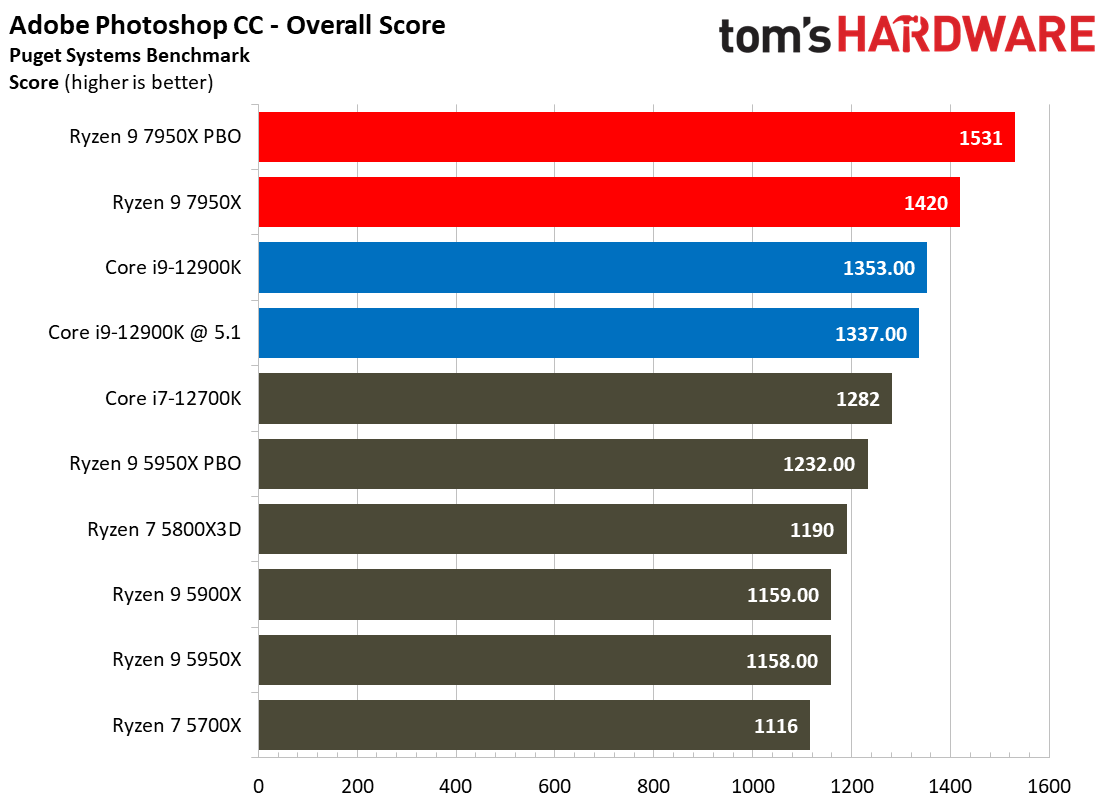
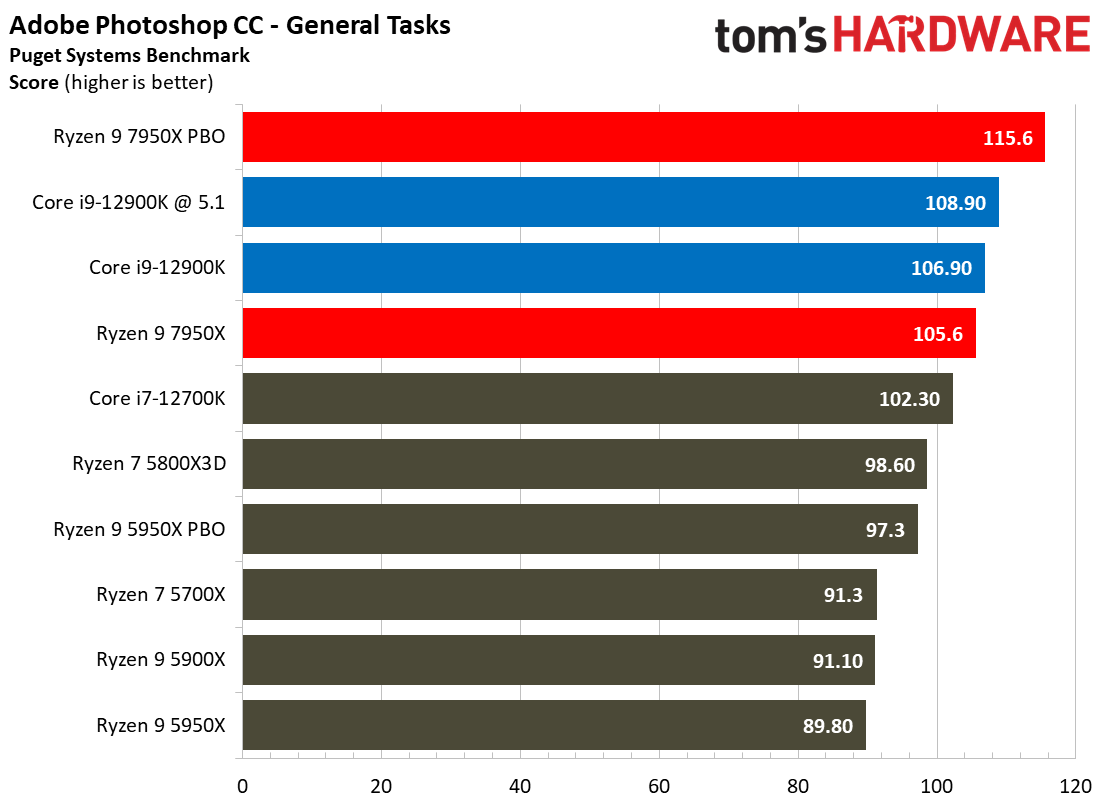
The Photoshop benchmark gauges performance in a diverse range of tasks, measuring the time taken to complete general tasks and apply filters. This test leans heavily on GPU acceleration, and it's clear that high clock rates benefit performance tremendously. The 7950X is 5% faster than the 12900K at stock settings, and 15% faster after tuning. It’s also 22% faster than the prior-gen 5950X.
The Ryzen 9 7950X is even more impressive in Puget’s Adobe After Effects benchmark, taking an 8% lead over the 12900K at stock settings and expanding to a 13% lead after overclocking. The 7950X is also 29% faster than the 5950X. Once again, we see the Core i9-12900K take a step backward after overclocking.
SPECworkstation 3 Benchmarks on AMD Ryzen 9 7950X
The SPECworkstation 3 benchmark suite is designed to measure workstation performance in professional applications. The full suite consists of more than 30 applications split among seven categories, but we've winnowed down the list to tests that largely focus specifically on CPU performance. We haven't submitted these benchmarks to the SPEC organization, so these are not official benchmarks.
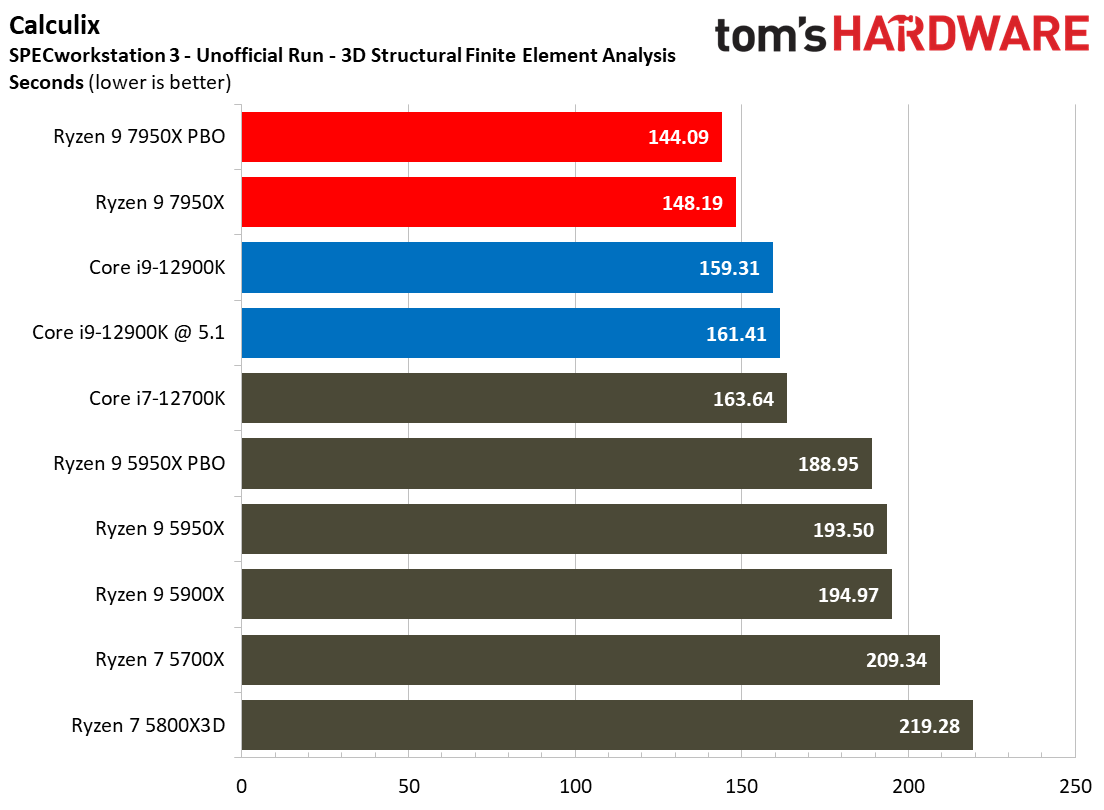
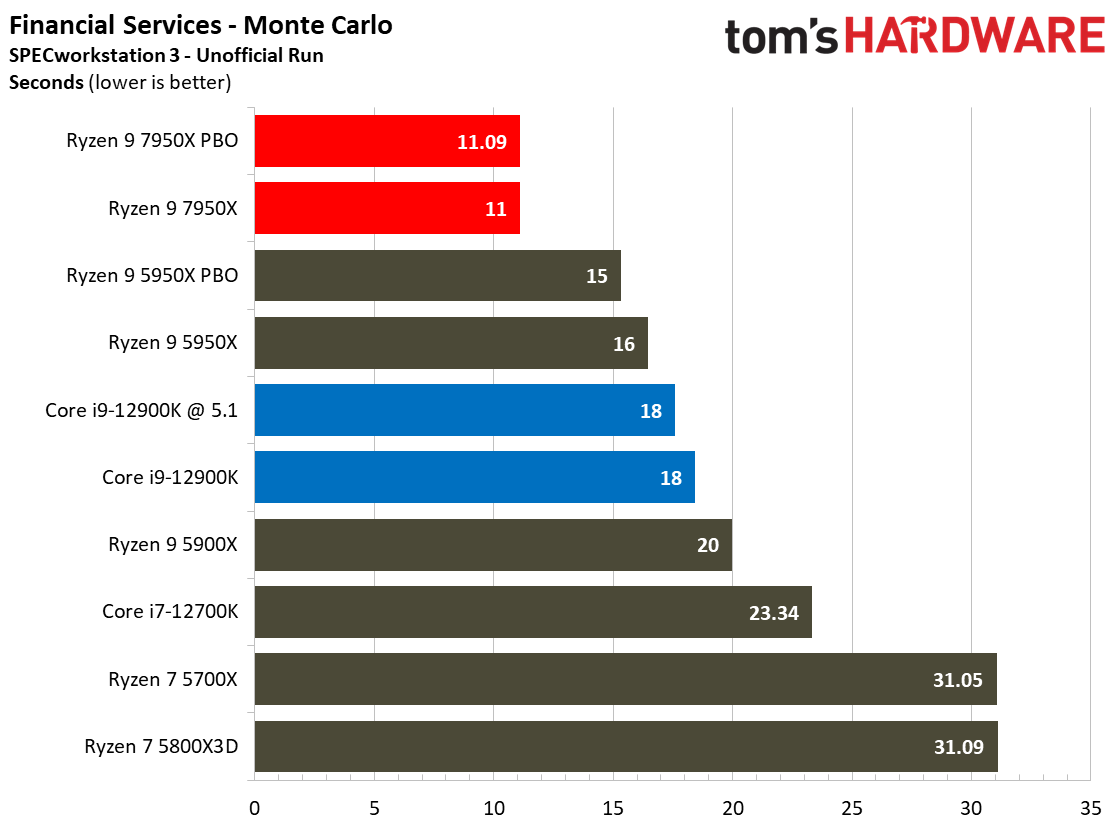
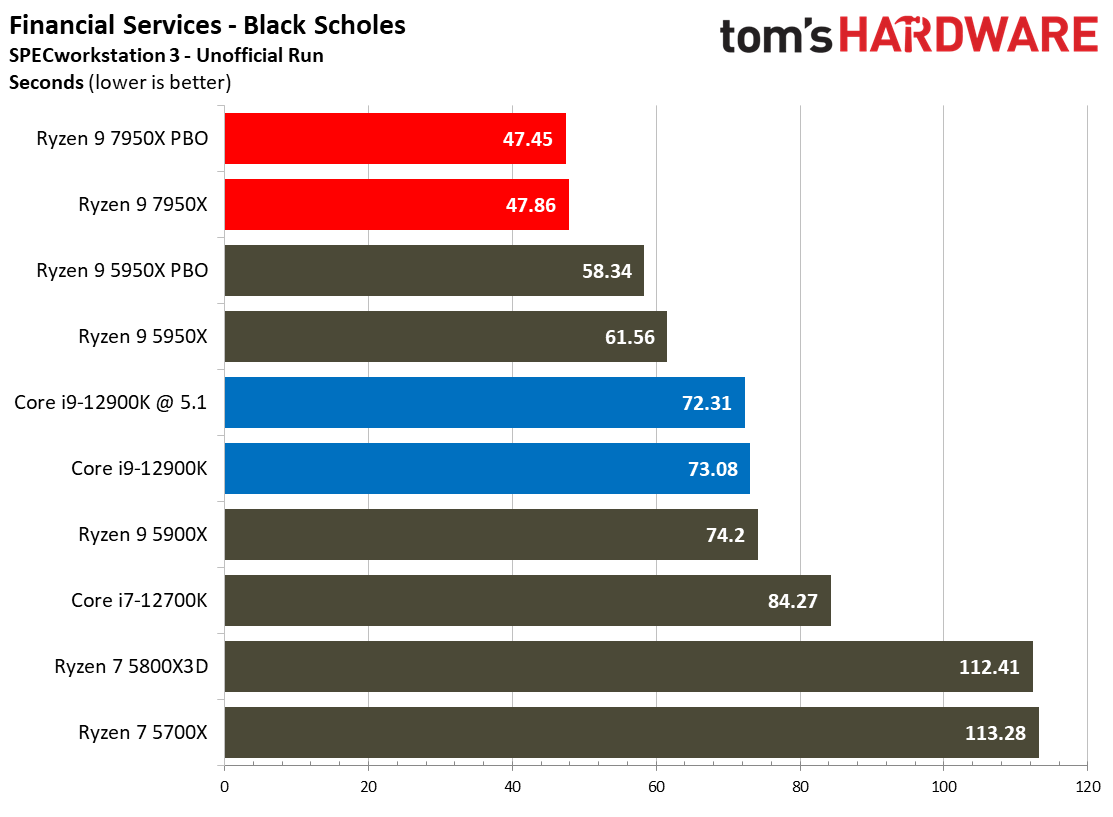
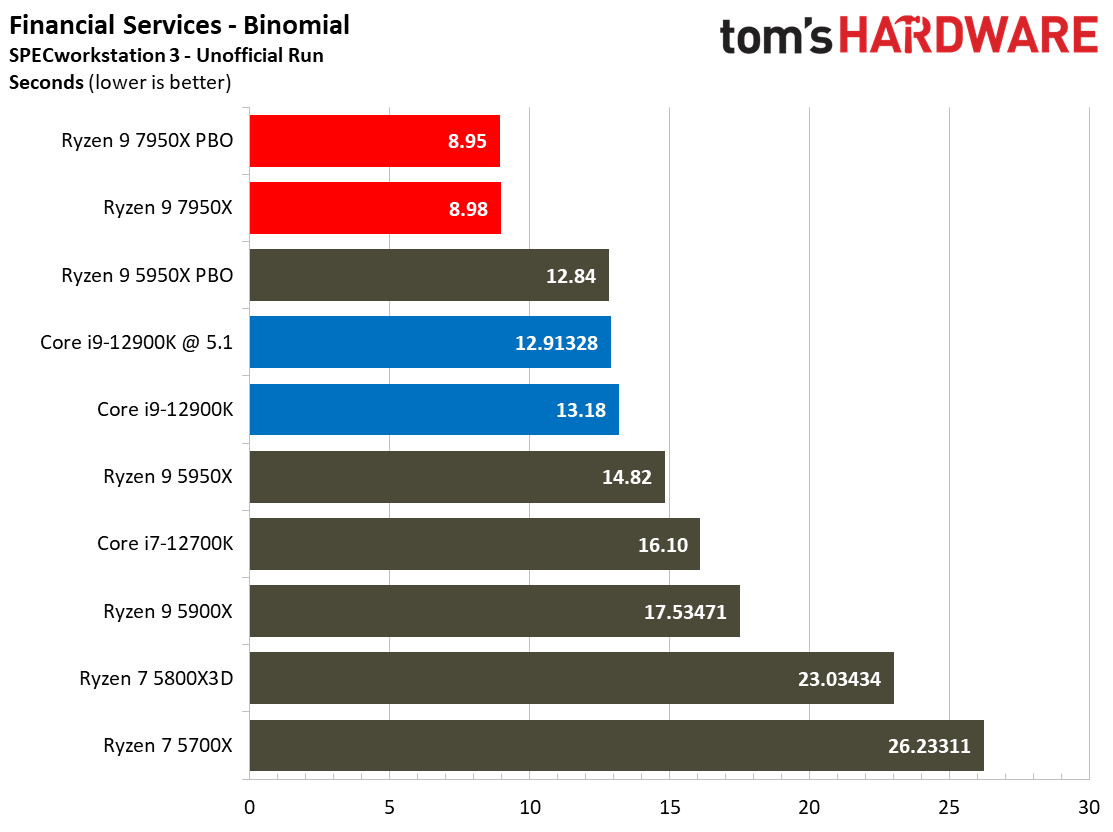
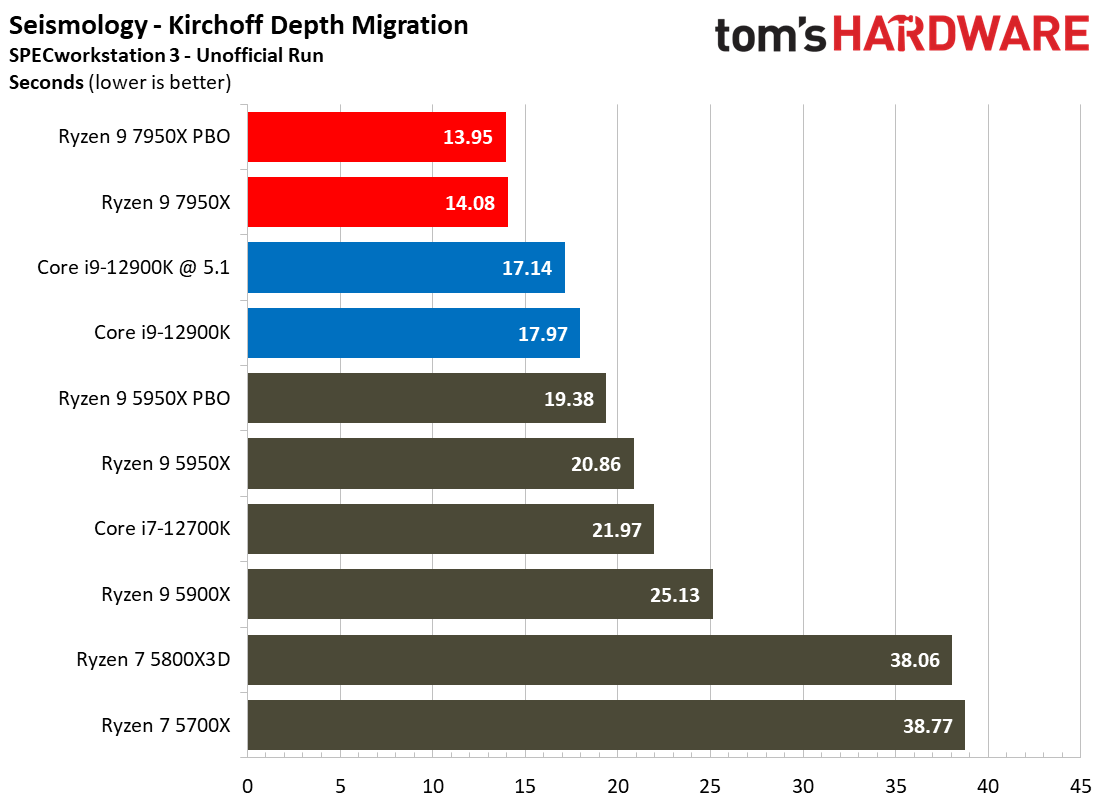
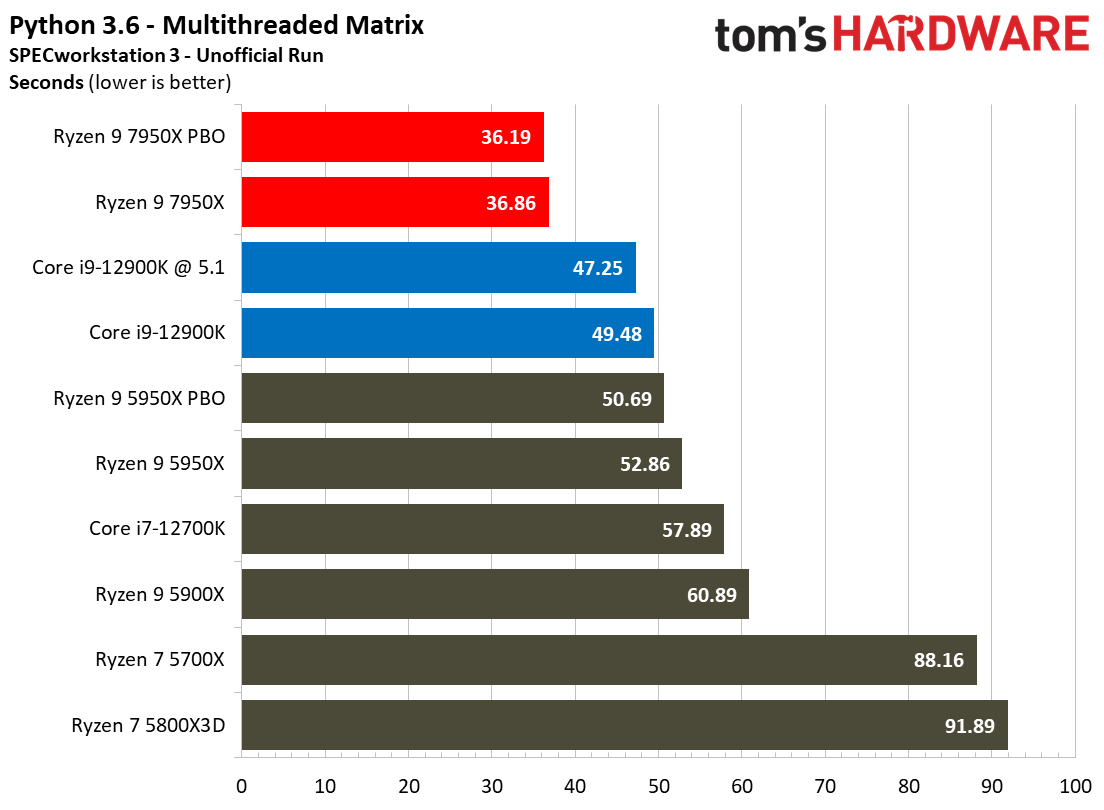
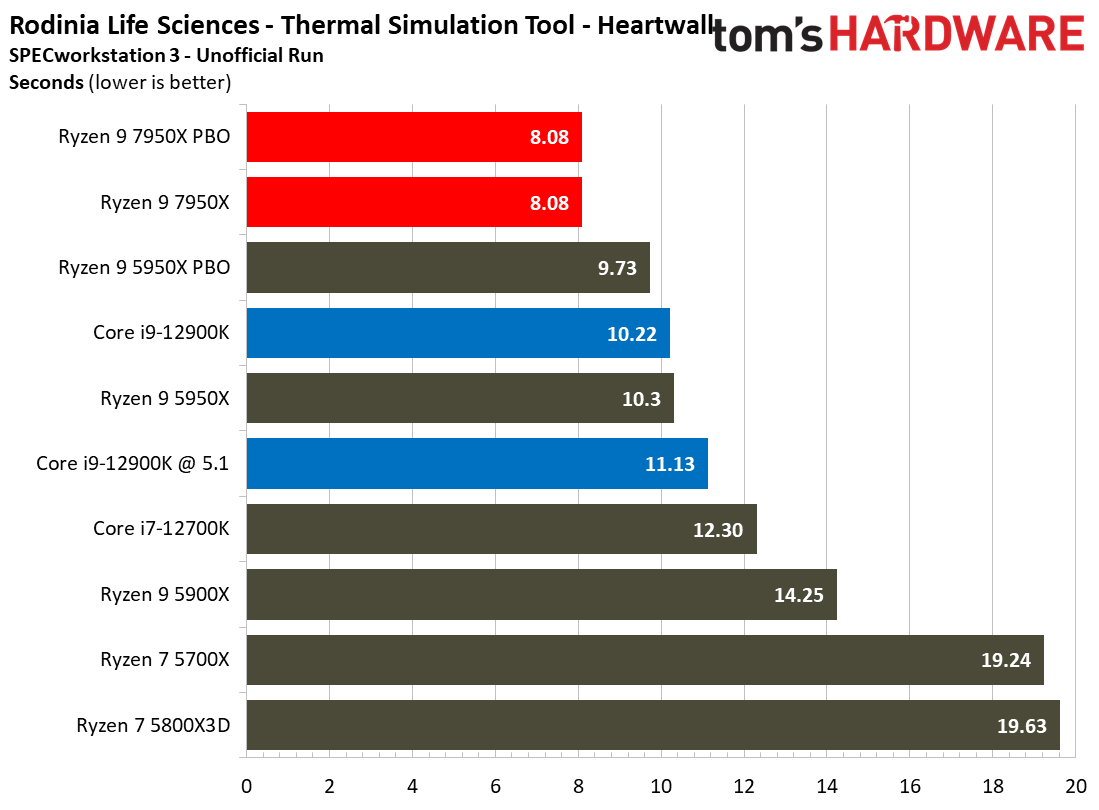
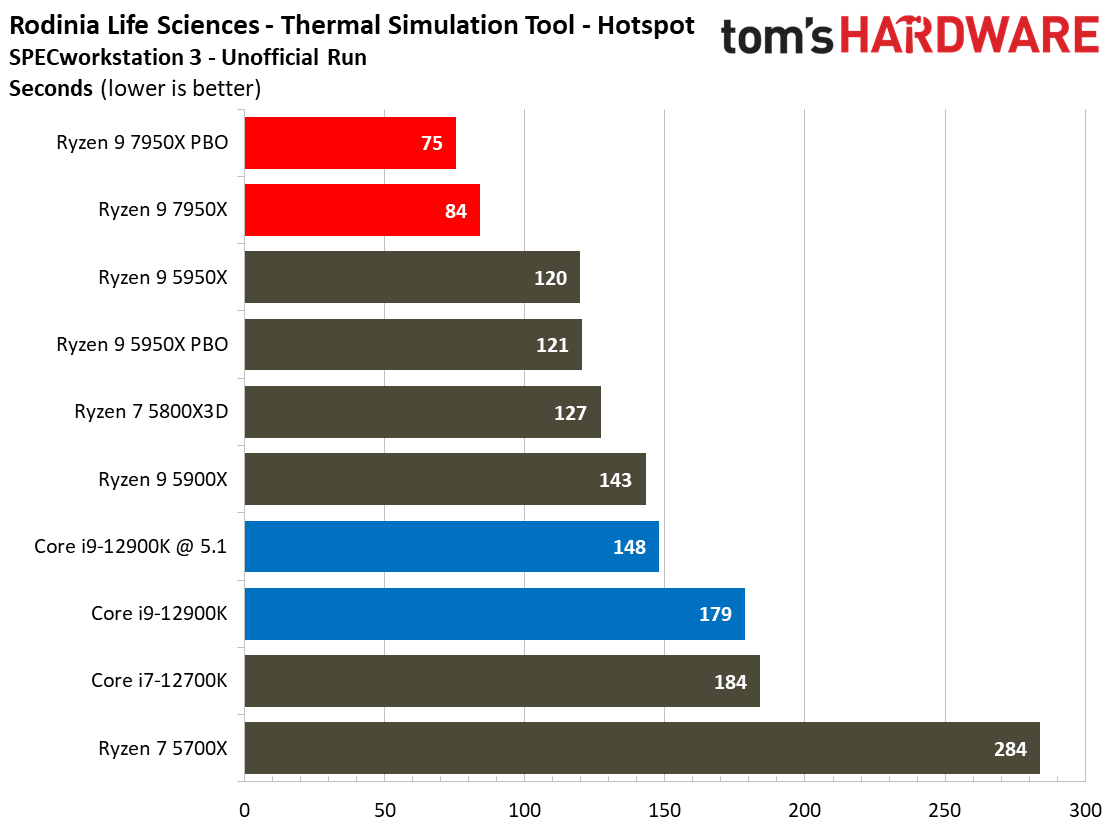
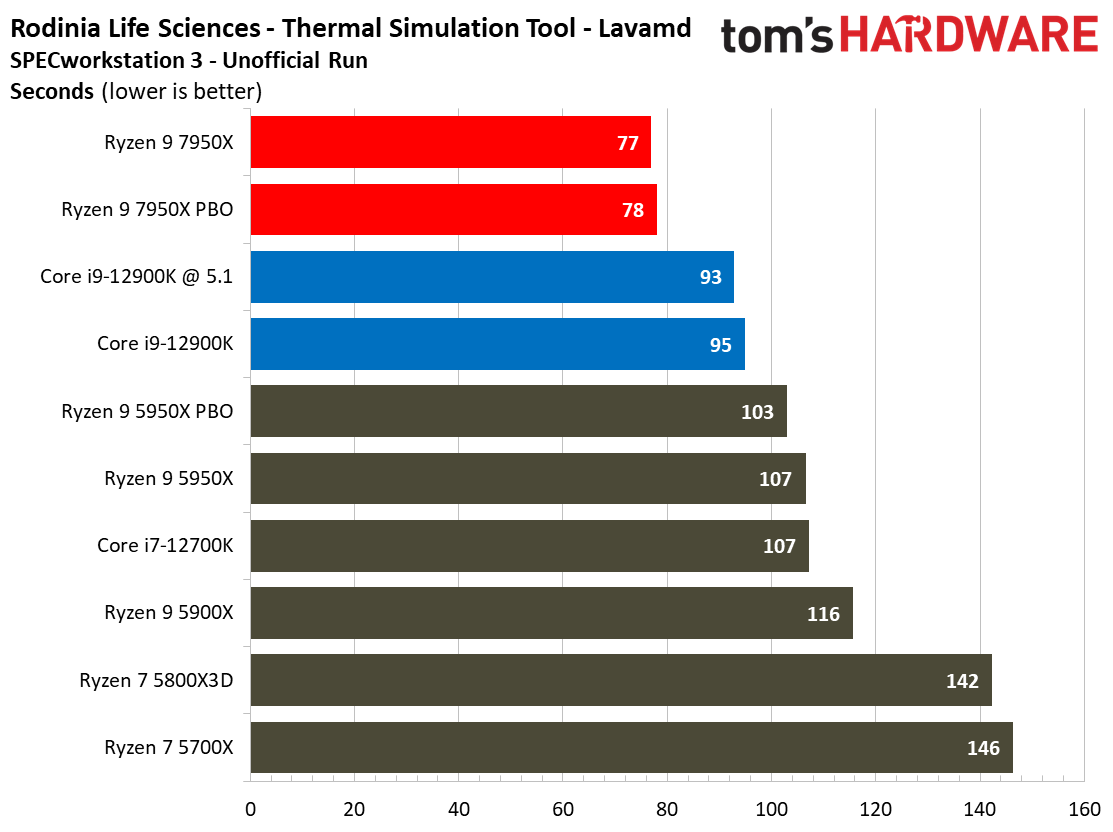
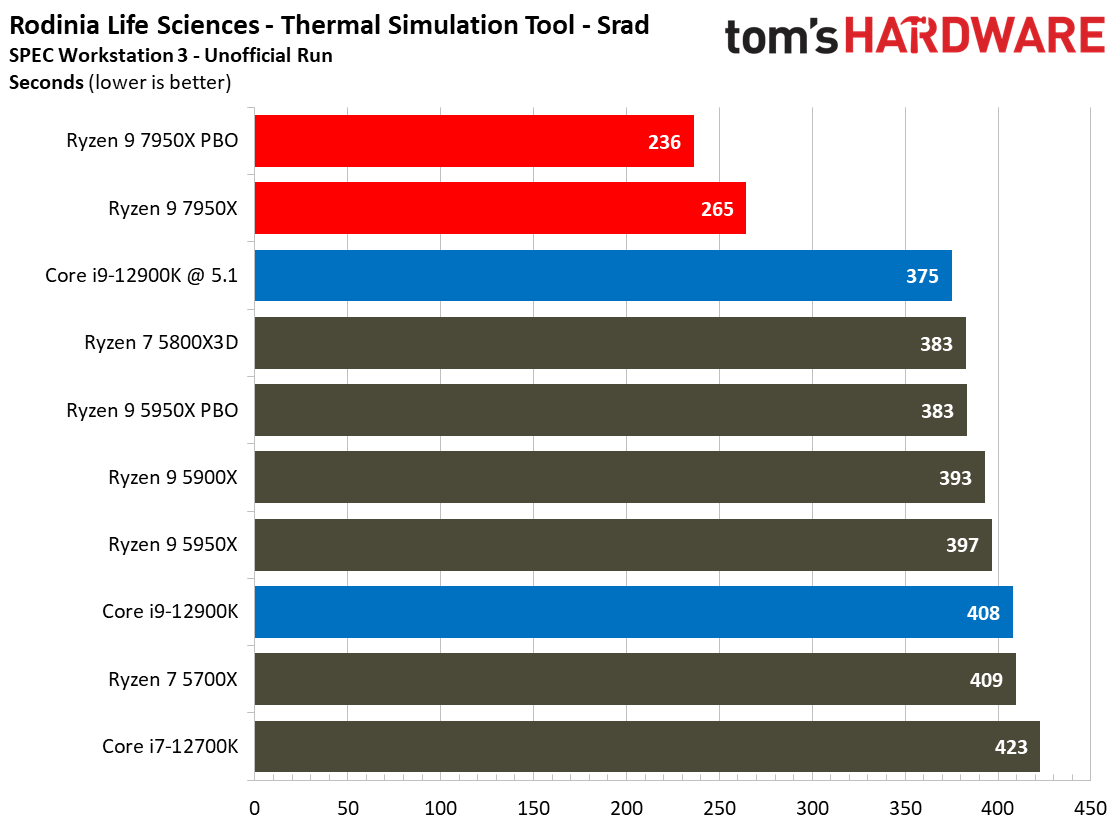
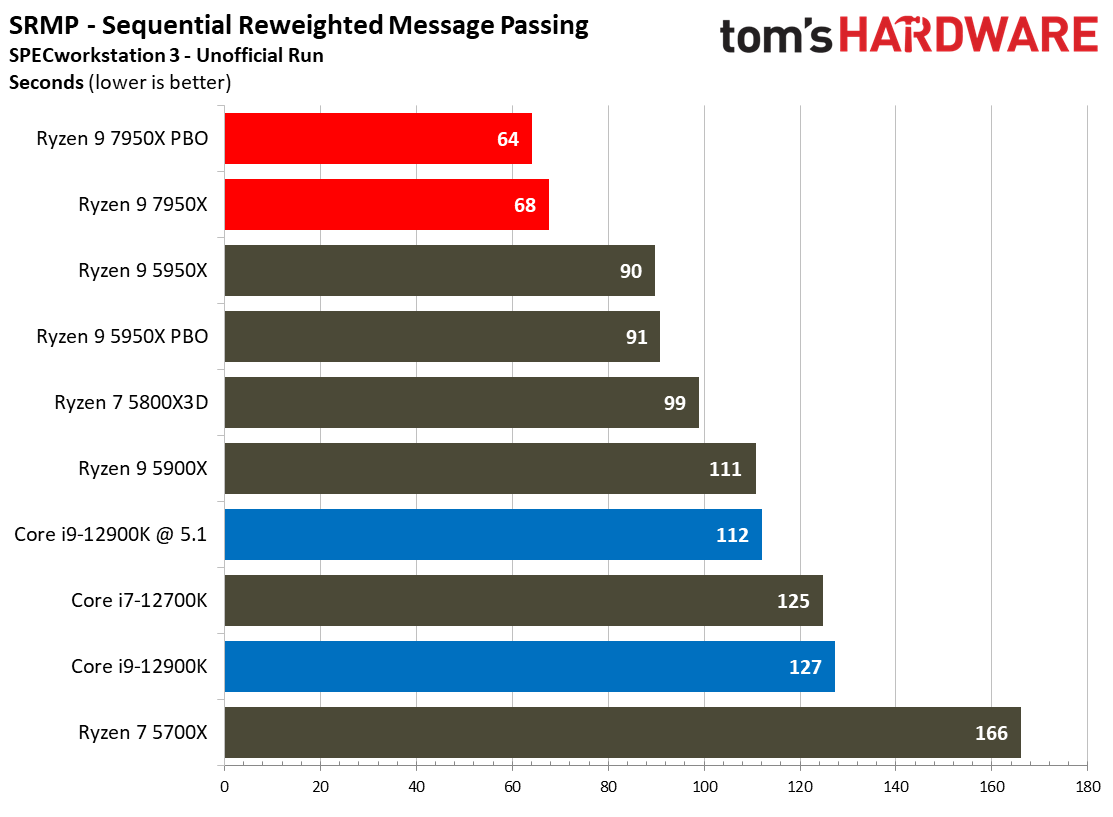
The Calculix workload is based on the finite element method for three-dimensional structural computations, and it typically responds well to both higher core counts and clocks. The 7950X leads here where Ryzen 9 trailed before, exhibiting yet another impressive speed up.
SPECworkstation 3's Rodinia LifeSciences benchmark steps through four tests that include medical imaging, particle movements in a 3D space, a thermal simulation, and image-enhancing programs. The 5950X dominates these heavily-threaded workloads,
The earth’s subsurface structure can be determined via seismic processing. One of the four basic steps in this process is the Kirchhoff Migration, which generates an image based on the available data using mathematical operations. Threaded horsepower comes into play, and once again, we see the 7950X take the lead.
- MORE: Best CPUs for Gaming
- MORE: CPU Benchmark Hierarchy
- MORE: AMD vs Intel
- MORE: Zen 4 Ryzen 7000 All We Know
- MORE: Raptor Lake All We Know
Current page: Workstation CPU and GPU Benchmarks on Ryzen 9 7950X and Ryzen 5 7600X
Prev Page Desktop PC Application Benchmarks on Ryzen 9 7950X and Ryzen 5 7600X Next Page Spicy, but Pricey
Paul Alcorn is the Managing Editor: News and Emerging Tech for Tom's Hardware US. He also writes news and reviews on CPUs, storage, and enterprise hardware.
-
-Fran- Thanks for the review(s)!Reply
Good to see more reaffirmation these CPUs don't have a performance problem, but a platform cost (or "cost of entry") problem with them. I hope AMD can alleviate it a bit so they become more of a mainstream crowd fav.
One small point that I won't really defend much, but buying into the AM5 platform, you buy into several years of support. The huge caveat is you have to trust not only AMD, but the partners to go with it and roll the BIOS updates down the line. This being said, after AM4, I'd imagine both AMD and partners have seen it does matter they do keep supporting newer CPUs and see that as a strength. Maybe partners would rather convince you to buy a new motherboard, but allowing this "mix and match" with generations does help overall sales; or so it is my impression. Plus, we all know which motherboard vendors actually followed through with the updates, so they'll get more sales once B650 launches. Could Tom's have the list of motherboards from the 300-series chipsets that do support Ry5K? That would actually help track which partners are indeed reliable and can be trusted with buying into AM5.
Regards. -
Alvar "Miles" Udell The headline: AMD Ryzen 9 7950X and Ryzen 5 7600X Review: A Return to Gaming DominanceReply
The reality: 5800X3D performs better in games than either of those. -
-Fran- Reply
To be pedantic, the title is correct. They now have more than just 1 CPU topping the charts and most (if not all) above Intel offerings.Alvar Miles Udell said:The headline: AMD Ryzen 9 7950X and Ryzen 5 7600X Review: A Return to Gaming Dominance
The reality: 5800X3D performs better in games than either of those.
You'd be correct if the title was something like "7950X is the new gaming overlord/king/champion*" or something that implies "the CPU is 1st in gaming", which as you clearly noticed, it is not.
Plus, it depends on the game anyway.
Regards. -
BogdanH I didn't read the article, simply because it's too long -quick view on some of pages gave me impression, that there's a lot of repeating from previous articles.. so why bother.Reply
Another reason why I didn't read, is the title. When I see a CPU like 7900X/7950X (or Intel's pendant) in conjunction with "gaming", I can already imagine the content. I assume, such title should grab the attention... I'm not sure who's attention, though. Are you trying to convince "gamers" to shell out 800€ for CPU alone? Yes, there's always said, that for gaming alone, it's "wiser" to get 7600X (or 5800X3D) -but such title still imply that 7950X is simply "the right thing"... "if you wish to have it all..". -again, that's my impression, so feel free to diagree.
Ok, so you say (for example), 7950X is 15% faster (in whatever) than 5950X. Now, some of this performance increase happens thanks to faster new DDR5 memory. And quite a lot performance increase (in my opinion) goes to much higher clock speed -which in turn comes back as heat dissipation. There's also faster PCIe5.0, etc ... Now I wonder, how much has actual CPU improved (compared to 5950X)? I mean IPC. Because if IPC is the same, then I see 7950X as a "brute force" improvement. In sense: Make it faster, no matter the costs (power draw & heat dissipation).
Yes, I know: 7950X finishes work faster (than 5950X) and so at the end, electricity bill will be lower. That's true if we look strictly from CPU side. But, if we take the cooling (of whole PC) into account, then the total power draw doesn't look that appealing anymore -especially in summer. In short: CPU is more efficient, but whole PC probably isn't.
I can read many times in forums, that many are already running their PC in eco-mode (to save energy, to make PC more silent, having less heat in room, etc) -they're ready to sacrifice fps by few percent for that. So I assume, what they wish or hope for, is certain performance increase, without affecting power draw -at least not by much.
I don't blame AMD/Intel/Nvidia for going into high power consumption direction. They know we wish everything faster (than it was in previous generation), so they do it -and many will buy it.. and that's the whole idea,
However, I do blame media for not putting more investigation/research into efficiency and write about that.
Just sharing my thoughts (being aware I may be wrong)
Bogdan -
DavidLejdar Reply-Fran- said:Thanks for the review(s)!
Good to see more reaffirmation these CPUs don't have a performance problem, but a platform cost (or "cost of entry") problem with them. I hope AMD can alleviate it a bit so they become more of a mainstream crowd fav.
...
If one wants to go for as cheap a build as possible e.g. just to play CS:GO, then yeah, the DDR5 requirement with AM5 may sure be off-putting. Myself, I will be upgrading in the near future from DDR3 anyhow, and (here) the extra cost for 32 GB DDR5-5200 (instead of DDR4-3200) is around 80 currently. At the same time, B650E has PCIe 5.0 both for GPU (16x) and NVMe at currently around 300-400 cheaper than what motherboards for Raptor Lake with the same connectivity cost (that is the few released so far). And only a handful of Alder Lake MBs have PCIe 5.0 for NVMe, while taking away 8 lanes from the GPU for that though.
So what I am currently looking at is around 250 for AM5 motherboard and 170 for 32 GB of DDR5 - which isn't as cheap as it can get, but should be plenty good for at least several years, giving me the option to upgrade individual parts later.
And to me that seems worth it to go for that, instead of saving perhaps 100 bucks with a Raptor Lake MB and DDR4 now, which likely won't support Meteor Lake already and would require me to get a lot of new parts then if I may want to boost performance in a year or two.
Of course, as you point out, not really a guarantee that even AMD directly may not push AM6 soon if Meteor Lake is taking it all to very new heights. But even if I upgrade the MB sooner than I was expecting, at least I will already have DDR5 to reuse, including having made use of it in the meantime.
BogdanH said:... . But, if we take the cooling (of whole PC) into account, then the total power draw doesn't look that appealing anymore -especially in summer. In short: CPU is more efficient, but whole PC probably isn't.
I can read many times in forums, that many are already running their PC in eco-mode (to save energy, to make PC more silent, having less heat in room, etc) -they're ready to sacrifice fps by few percent for that. So I assume, what they wish or hope for, is certain performance increase, without affecting power draw -at least not by much. ...
Very strictly taken, sure, the cooling uses some power too. But then again, a case fan has a power consumption of up to 6W, and CPU coolers (air or liquid) usually don't consume more than that. So even if all the cooling would take 20W at full load, that is 50 hours of full load to get to 1 kWh. And e.g. in the U.S., it is less than $1 for 4 kWh, isn't it?
The electricity costs can add up quickly though. E.g. if someone is gaming 50 hours a week at 700W, that's possibly up to 35 kWh right there, coming to 140 kWh a month.
Myself, I wouldn't know how to have that much time for gaming. So even if my rig would consume 700W, perhaps every other week to play at full load for a total of 10 hours, at the U.S. electricity price that would be less than $2.
Which isn't to say that it wouldn't be nice if there would be more improvement for power efficiency. But the review mentions that the Ryzen 5 7600X is a very sound choice for gaming (unless one can wait a few months to check out the gaming specific CPU). And that one has quite less Watt than the top tier one. And coupled with perhaps not the top-tier GPU around, e.g. the RTX 3060, which has around 200W, one can have a solid build which comes in at under 500W at full load. -
BogdanH Reply
-that's 20W (probably less) just to move hot air out of PC case into our room.. which we need to cool in summer days.DavidLejdar said:Very strictly taken, sure, the cooling uses some power too. But then again, a case fan has a power consumption of up to 6W, and CPU coolers (air or liquid) usually don't consume more than that. So even if all the cooling would take 20W at full load...
Many say, it's "only 10€/year more" (or whatever number).. but there are millions of PC's running. And if looking that way, we can see see how much energy is wasted.. and is really not about who can afford to pay electricity and who can't.
Best wishes,
Bogdan -
chalabam Der Bauer has shown that this CPU is 20 degrees hotter than it should be due to bad packagingReply -
Sluggotg Nice new lineup for AMD. Looking forward to the industry moving to PCIE 5 and USB 4. The 7600 is very impressive. (For 300 Bucks!). With Intel's new chips coming out next month we should see some very healthy competition that will hopefully lead to overall lower prices. With the New CPUs and the New Graphics cards all coming out in the next several months, we should be able to do some nice upgrades. Hopefully the Scalpers will fail to corner the market.Reply -
-Fran- Reply
Er... Paul (the article) did include IPC measurements and a couple parragraphs to that. Zen4 is indeed faster, clock for clock, than Zen3. It's just it gets more overall performance from the increased clocks (hence the higher power budget) than raw IPC improvements.BogdanH said:I didn't read the article, simply because it's too long -quick view on some of pages gave me impression, that there's a lot of repeating from previous articles.. so why bother.
Another reason why I didn't read, is the title. When I see a CPU like 7900X/7950X (or Intel's pendant) in conjunction with "gaming", I can already imagine the content. I assume, such title should grab the attention... I'm not sure who's attention, though. Are you trying to convince "gamers" to shell out 800€ for CPU alone? Yes, there's always said, that for gaming alone, it's "wiser" to get 7600X (or 5800X3D) -but such title still imply that 7950X is simply "the right thing"... "if you wish to have it all..". -again, that's my impression, so feel free to diagree.
Ok, so you say (for example), 7950X is 15% faster (in whatever) than 5950X. Now, some of this performance increase happens thanks to faster new DDR5 memory. And quite a lot performance increase (in my opinion) goes to much higher clock speed -which in turn comes back as heat dissipation. There's also faster PCIe5.0, etc ... Now I wonder, how much has actual CPU improved (compared to 5950X)? I mean IPC. Because if IPC is the same, then I see 7950X as a "brute force" improvement. In sense: Make it faster, no matter the costs (power draw & heat dissipation).
Yes, I know: 7950X finishes work faster (than 5950X) and so at the end, electricity bill will be lower. That's true if we look strictly from CPU side. But, if we take the cooling (of whole PC) into account, then the total power draw doesn't look that appealing anymore -especially in summer. In short: CPU is more efficient, but whole PC probably isn't.
I can read many times in forums, that many are already running their PC in eco-mode (to save energy, to make PC more silent, having less heat in room, etc) -they're ready to sacrifice fps by few percent for that. So I assume, what they wish or hope for, is certain performance increase, without affecting power draw -at least not by much.
I don't blame AMD/Intel/Nvidia for going into high power consumption direction. They know we wish everything faster (than it was in previous generation), so they do it -and many will buy it.. and that's the whole idea,
However, I do blame media for not putting more investigation/research into efficiency and write about that.
Just sharing my thoughts (being aware I may be wrong)
Bogdan
Regards. -
hotaru251 so zen 3 they held out entire generation for a 5700xReply
and now zen 4 its the 7800x missing...AMD ffs why do you do this?
and as said before...the cpu are great, but platform isnt worth it with 5800x3d existing.
(will likely change by time weg et 3d cache zen4 cpus)